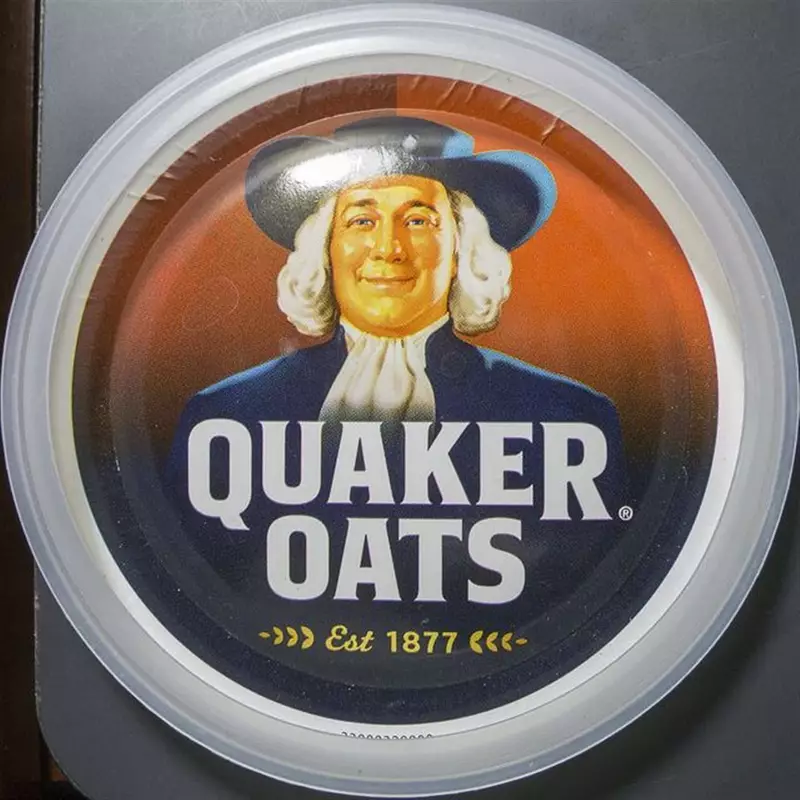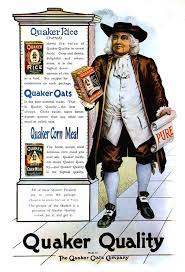When we think of Quakers, a familiar image might come to mind:

the iconic man in a wide-brimmed hat and simple attire, known for adorning porridge boxes.

However, there’s much more to Quakers than this familiar brand image.
Their rich history, particularly in the UK, is deeply intertwined with cocoa and chocolate, showcasing a legacy of ethical business practices and pioneering innovations.
Quaker Origins and Ethical Business
Quakers, officially known as the Religious Society of Friends, emerged in the 17th century as a protest against the established Church of England.
Their refusal to swear allegiance to the Church led to their exclusion from public life, universities, and various offices.
This limitation on their opportunities drove many Quakers towards business and commerce, finding their niche in the food sector.
In the 18th and 19th centuries, British Quakers made significant contributions to various industries, establishing well-known businesses such as Barclays Bank, Bryant & May, Clark's shoes, and Huntley & Palmers biscuits.
Among these ventures, their involvement in the chocolate industry stands out as particularly noteworthy.
A Faith-Based Approach to Business
The Quakers' entry into the cocoa and chocolate business was deeply influenced by their faith and values.
They introduced fixed prices for their goods at a time when bartering was common, fostering trust and transparency with customers.
This commitment to fair pricing and ethical practices helped them create a competitive edge.
Furthermore, tea, cocoa, and sugar were seen as ethical alternatives to alcohol, aligning with the Quaker principles of temperance and social responsibility.
This approach not only resonated with consumers but also contributed to the success of Quaker-owned businesses.
The Rise of Quaker Chocolate Pioneers
During the Victorian era, as chocolate gained immense popularity, Quaker-owned businesses began to make their mark:
Fry's: Joseph Fry, a Bristol-based apothecary, started selling cocoa in 1759, promoting its health benefits.
By 1764, Fry, Vaughan, & Co had established agents in various towns and a chocolate warehouse in London.
Joseph’s son introduced innovative factory production techniques using the Watts steam engine, and Fry's was the first to produce a solid chocolate bar in 1847.
Cadbury: John Cadbury, after an apprenticeship in the tea trade, set up his own business in Birmingham in 1824. Cadbury’s early price list from 1842 featured a range of drinking chocolate and cocoa varieties.
The company's dedication to quality, purity, and inventive marketing, including selling chocolates in decorative boxes, contributed to its lasting success.
Rowntree's: Joseph Rowntree, who left his family’s grocery business in York, founded Rowntree’s in 1869.
Rowntree's not only became known for its products but also for its commitment to the well-being of its workforce and the community.
The establishment of New Earswick, a village offering education and support for low-income families, exemplified their ethical approach.
Ethical Legacy and Modern Challenges
Quaker-owned chocolate companies were pioneers in promoting fair wages, employee well-being, and ethical practices.
Rowntree's, Cadbury, and Fry's introduced progressive employee benefits, including shorter workweeks, pension schemes, and improved labour laws.
However, as these companies evolved, they faced transformations. Multinational corporations like Nestlé and Mondelez International acquired these businesses, altering the industry’s landscape.
The original ethical values of these companies have often been overshadowed by a focus on profitability.
A Bittersweet Conclusion
The story of Quaker chocolate is one of innovation, values, and ethical commitments. Yet, as the industry has transformed, some challenges have emerged.
Modern chocolate production has faced issues such as child labour, deforestation, and the use of environmentally problematic ingredients like palm oil.
The legacy of Quaker chocolate pioneers serves as a reminder that business success can be achieved alongside ethical practices.
While these companies have evolved and faced new challenges, their origins highlight the potential for a more responsible and sustainable chocolate industry.
As consumers, reflecting on the journey from Quaker values to modern challenges can inspire advocacy for ethical practices and greater responsibility in the chocolate industry.
In an ever-changing world, the story of Quaker chocolate continues to inspire discussions about business ethics, responsibility, and the impact we have as consumers.
